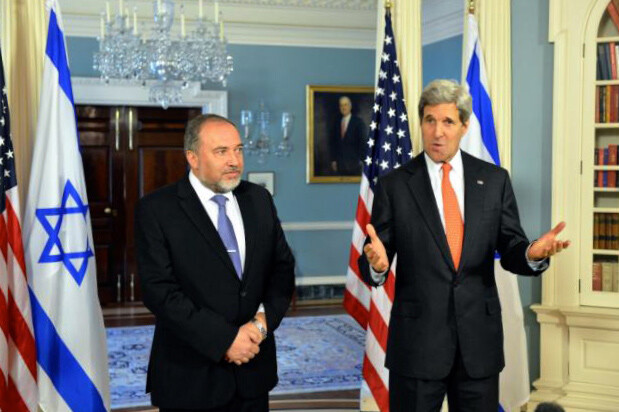Media Watch 10 April 2014

US Secretary of State John Kerry (right) and Israeli Foreign Minister Avigdor Lieberman address reporters on 9 April.
State Department photoOn Tuesday, US Secretary of State John Kerry pointed the finger of blame at Israel for the collapse of talks with the Palestinian Authority.
The United States’ most senior diplomat gave his explanation to the foreign relations committee of why the talks, ongoing since July 2013, had broken down.
“The prisoners were not released by Israel on the day they were supposed to be released and then another day passed and another day and then 700 [settlement] units were approved in Jerusalem and then poof — that was sort of the moment,” he said. “We find ourselves where we are.”
As part of the preconditions for negotiations, Israel had agreed to release 106 Palestinian prisoners who had been held in Israeli jails for more than 22 years. The prisoners were due to be released in three stages, with the fourth stage scheduled for 29 March.
That fourth release didn’t happen and, on 1 April, Palestinian Authority leader Mahmoud Abbas signed letters of accession to 15 UN treaties and conventions. It’s a right he has had since November 2012, when the UN voted to recognize Palestine as a state, but had agreed not to exercise while the talks were ongoing.
When Israel reneged on the final prisoner release at the end of March, Abbas went ahead and put his signature to the UN documents.
And while Kerry on Tuesday described the Palestinian move as “unhelpful,” he was quite clear that the primary cause of the breakdown lay in the Israeli camp.
BBC ignores Kerry remarks
For Israel’s strongest ally, the US, to make an accusation like that was quite extraordinary and perhaps unprecedented.
And yet, in the newsrooms of the BBC, the world’s largest news organization, it was as if Kerry had never spoken.
While other news organizations in the US and the UK covered the story from the angle of what has become known as Kerry’s “poof speech,” BBC Online focused on Israeli Prime Minister Benjamin Netanyahu’s order to his ministers to cease high level meetings with their Palestinian counterparts as a result of Abbas’s 1 April actions.
In a report headlined “Israel PM Netanyahu curbs contact with Palestinians,” the BBC’s news team writes: “The order follows ‘Palestinians’ violation of their commitments under peace talks,’ officials said.”
And so the BBC pointedly began its article with Israeli allegations of Palestinian violations, failing to clarify later that Abbas only signed the UN treaties and conventions after talks had broken down, as agreed.
Kerry’s frustrated remarks about Israel were not reported at all in that article, or elsewhere by the BBC online. Careful not to alert its audience to the US Secretary of State’s allegations against Israel, or to carry a narrative that even so much as hinted at them, the BBC said only: “He blamed both sides for taking ‘unhelpful’ steps.” The rest was ignored.
Providing the facts
The rest, of course, is the actual news story – Kerry giving voice to US exasperation with Israel. However, the BBC’s news values when it comes to reporting on Israel and the Palestinians defy all normal standards of journalism.
Compare the 9 April BBC report with other reports that the same day in both the UK and the US.
In the UK, three broadsheet newspapers could be said to represent the political spectrum – The Telegraph to the right, the Guardian to the left and the Independent in the middle.
Published a day after Kerry made his comments, the three papers added new angles in an attempt to update the story, but the basic news story was the same – Kerry’s astonishing comments about one of the US’ most favored allies.
The Independent’s headline states: “US Secretary of State John Kerry faces “anti-Semitic” claims for blaming failing of talks on Israel.”
Correspondent Ben Lynfield writes: “Mr. Kerry, making an appearance before senators on Tuesday, traced the crisis to Israel’s failure to release the prisoners.” He goes on to quote Kerry’s words to the senate foreign relations committee.
In the Guardian, Middle East correspondent Ian Black writes: “First in the sequence of events [Kerry] described came Israel’s refusal to free 26 prisoners (vital for Mahmoud Abbas to demonstrate he has something tangible to show for negotiating); then the announcement of 700 new settlement units (‘Poof, that was the moment,’ Kerry said); and only then came the violation by the Palestinians – their unilateral move to sign up to international treaties to allow them to tackle Israel’s 46-year-old occupation through legal means.”
The Telegraph interviewed Yuval Steinitz, the Israeli intelligence and strategic affairs minister, who claimed that Israel will offer a deal to rescue the talks.
However, even this right-wing, pro-Israeli paper did not fail, as the BBC did in its report, to provide the full facts of the story.
David Blair, chief foreign correspondent, writes: “Mr Kerry said that ‘both sides’ were responsible for the impasse, but appeared to place most of the blame on Israel, noting that after missing the deadline for releasing the prisoners, the Israeli government then approved the expansion of a settlement in East Jerusalem.”
“Absurd” denials of bias
In the US, where the major news organizations are traditionally biased toward Israel, there was no attempt to hide the Secretary of State’s finger-pointing at the US’s favored country.
The Washington Post led with the headline “Kerry raps Israel in faltering Mideast peace.”
Its editors go straight in with the story as they saw it. “US efforts to broker a Mideast peace agreement faltered after Israel refused to release prisoners as demanded by Palestinian leaders, then moved forward with plans to build new settlement housing in Jerusalem, America’s top diplomat said Tuesday,” is the introduction.
The New York Times reported along the same lines, saying that the “precipitating event” for the breakdown, according to Kerry, was Israel’s announcement of new settlement building in East Jerusalem.
It adds that Israel had “undercut an emerging deal to extend the negotiations” by failing to carry out the final prisoner release.
Time magazine also reported on Kerry’s comments, “which appeared to blame Israel for the latest breakdown in Middle East peace talks.”
In Israel itself, Haaretz newspaper’s headline was blunt: “Kerry places blame on Israel for crisis in peace talks.”
Across the UK, US and in Israel, journalists were grasping the news story and reporting on it. Even newspapers with an inclination towards Israel did not shy away from reporting the news, unpalatable though it would have been to them, and keeping their readers informed.
Only the BBC, the UK’s public broadcaster, failed to do so and left its audiences completely in the dark. Why? And, while keeping news of Kerry’s allegations from them, why did BBC Online chose to lead its story with Israeli accusations of “Palestinian violations” instead?
The BBC, when challenged, will of course refute allegations of bias towards Israel in its reporting. But when its news operation seems so blatantly designed to shield Israel from criticism at the expense of professional journalistic standards, those denials seem ever more absurd.






Comments
The bias continues
Permalink Russell replied on
I'm increasingly angered by BBC reporting.
In this latest report (http://www.bbc.com/news/world-...) the order of words in one sentence suggests Palestinian anger (an emotive term to use) came first as a cause of the breakdown of the talks.:
"The Palestinians were angry when Israel did not sanction the release of a fourth batch of Palestinian prisoners, as agreed in principle under the terms on which they returned to peace talks last year."
Why not "Israel breaking its commitment to release prisoners... "
And the story concludes : "US Secretary of State John Kerry has blamed both sides for taking "unhelpful steps". The peace talks resumed in July under US auspices after a three-year hiatus.". Kerry clearly and explicitly blamed Israel as the excellent EI article above evidences. Additionally "Unhelpful steps" are the words used by Jen Psaki not Kerry - the quotation marks are misleading.
And again today
Permalink eGuard replied on
The same today by the BBC: Israel is just responding, no mentioning of Kerry's 'poof' statement, the blaming is sort of 50/50. BBC is reporting Israeli conditions uncritically [1], and simply taking the time sequence out of the timeline [2] ('any prisoner release conditional on progress being made in the negotiations [1] and on the Palestinians abiding by a commitment not to take unilateral steps which could be seen as furthering statehood [2]'). This is the BBC Worldservice.
http://www.bbc.com/news/world-...
BBC's selective reporting
Permalink Carol Scheller replied on
How much do they get paid ?
BBC
Permalink hasbarabasher replied on
I watched last night's (11 April) Ten O'clock News report about Ed Milliband's visit to Israel, with anger and incredulity. We were shown 'our Ed' looking out over Gaza and being shown the remnants of the pathetic rockets which sometimes make it into Israel, then well fed Jewish children supposedly traumatised and having to play under a bomb proof roof! Nothing of course about the recent killing of the poor Gazan child shot whilst collecting thistles to eat, or the children being tortured in the West Bank, or the children suffering and dying from the lack of medicines in Gaza due to the siege....we could go on and on but why has the BBC become such a mouthpiece for Zionism?
Why has the BBC become a mouthpiece for zionism?
Permalink Tess replied on
Well the BBC is either run by zionists, paid by them or threatened by them.
They may as well shut down shop as they are guilty of false reporting, much to the disgust of many viewers.
" THOU SHALLT NOT STAND IDLY BY..." AS YOU HAVE. DONE....
Permalink Peter Loeb replied on
I wonder if Kerry and the US have the capacity to learn about Israel and so-called
"agreements" it may make. .Israel continues to do as it pleases with the
superiority and arrogance of "hutzbah" and in disregard not only of Palestinians
but of the rest of the world. Decisions it doesn't like it calls "biased" and
continues murders, cleansing, depopulation, rape, destruction. Israel feels
that having been a victim of the Holocaust gives it eternal immunity. For
an in-depth critiqe see I. Pappe, THE ETHNIC CLEANSING OF PALESTINE
and Pappe's most recent work, THE IDEA OF ISRAEL (early months of 20014).
N. H. Aruri discusses US policy for the 35 years preceding George W. Bush
and B. Obama. Aruri's analyses do not favor any political party.